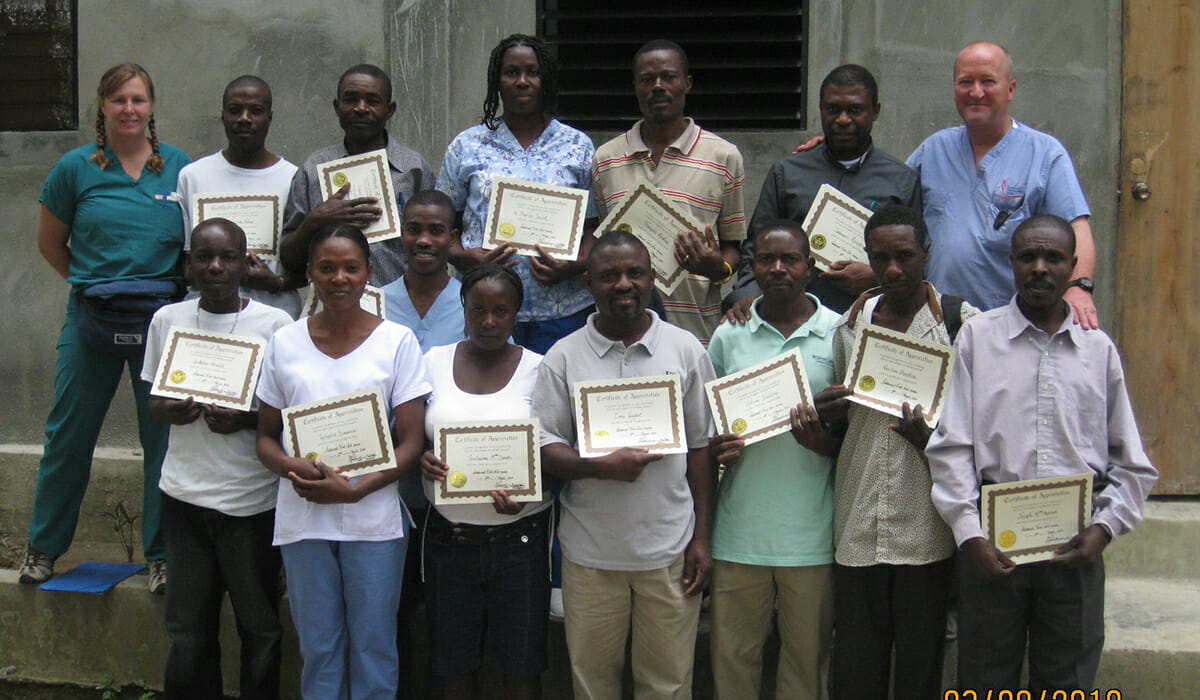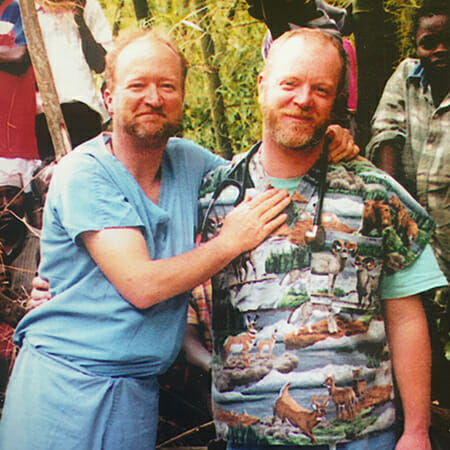For Two Decades, Retired EMT Brings Medical Aid and Support to Haiti

Meet Daily Point of Light Award honoree Gregory Winslow. Read his story and nominate an outstanding volunteer or family as a Point of Light.
Two decades ago, Gregory Winslow’s brother invited him to come on a trip to Haiti to provide medical aid for the people of Petit Bourg de Borgne. Since his initial invitation in 2001, Gregory has made 25 trips from his native Colorado to Haiti with aid organization I.C. Haiti, bringing much needed help to the Haitian people.
Gregory, who is a retired EMT, and his team helped establish a seven day-a-week medical clinic in Petit Bourg de Borgne where there was once no medical help at all. After the 2010 earthquake that brought devastation to the country, Gregory made six trips in that year alone to provide emergency medical care with Team Matthew 25 House, a group of medical personnel from Children’s Hospital Colorado. While the COVID-19 pandemic has put a temporary halt on his trips, Gregory looks forward to resuming them once it is safe to do so.
Describe your volunteer role with I.C. Haiti.
[I.C. Haiti] serviced about 80,000 people there [in the village Petit Bourg de Borgne]. It was medical services, school services. Medical services is what we originally started. It was through the Catholic Church, because they wanted to help the people of the village, so what they did was grab a medical team to go down and start helping people. We’ve got scabies. We’ve got AIDS. We’ve got this and that. We’ve got a goiters the size of footballs because they hadn’t been seen by a medical doctor in 30 years. They had no salt. Iodine is in your Morton salt. Iodine was the cure for goiters in the United States. They just didn’t have access to salt. These people — I will tell you, this is probably my biggest takeaway from my first trip in Haiti — as much trauma as pain they go through everyday, they were happier than most people I know who lived in the suburban USA.
I’ve done 25 trips in 20 plus years. Last year, obviously COVID shut us down, and this year we are still very hesitant. We are still funneling money to our village and we are still paying for all the doctors and nurses. When we first got there, they hadn’t had a medical clinic ever. We were the once-a-year medical clinic when we started this. We now have a seven days-a-week medical facility down there in that small village of 80,000.

What kind of aid do you provide to the people of Haiti?
Originally, Petit Bourg de Borgne was about medical, but I helped turn it into medical and let’s help educate these kids. Let’s actually teach them. Let’s get a school much stronger and better than what they’ve got right now. At the time when I first went, there was a broken-down school in that small village that housed about 60 students. The back half of that building got crushed two years later, so it was now down to room for 30 kids. I really pushed for our team to raise money for education and I’m very, very thankful and fortunate. … Dr. Tom Grabenstein and his wife have led this team since day one, way back probably 25 years ago. They were the first ones to take a trip to our village. What they saw and what they felt was that they needed a medical team down here to help physical ailments, try to help cleanliness. … When they made their first trip, they thought medical, and realistically that’s what they needed. That’s what they did for the first three or four years, ongoing ‘let’s get the people looked at, let’s find some answers to these problems.’ After about the third year, I talked to [them] one night when we were all in our little group and I said all the medical care we’re doing is wonderful, but what we need to do is teach prevention of medical issues. We need to educate our children here. We need to get them in school. We need to teach them basic right and wrong.
How did you become involved with Team Matthew 25 House?
Matthew 25 House is the name of the place where we stayed when we went for the earthquake in 2010. On January 6, I watched the destruction that was happening in Haiti. We had already planned our original I.C. Haiti trip in March for our small village way up north of Port-au-Prince. … When I saw the destruction of Port-au-Prince on January 6, I called my brother, and said “Look, I know we’re not prepared to go, but we need to go.” He said there’s no way, and I said we have to. We have a responsibility. After about 30 minutes of conversation, he hung up the phone and said I will call you back shortly. Then within about 45 minutes, we had put a team together from the children’s hospital in Denver. We had flight surgeons, we had flight medics, we had nurses, we had EMTs, and we could find the gear. Within hours, I drove from Gunnison to Denver and came down. We spent two days loading all of our equipment, making sure we had everything we needed for surgical, for lighting, to be safe, to do what we needed to do. … Hendrick Motorsports was the private jet that flew us down. They donated two of their planes for six to eight weeks. They were essential. There were so many teams wanting and needing to go. We were one of the first American teams on the ground on day six after the quake.
If you think about Matthew 25 — do unto others as I would do unto you. Plain and simple. This was what this was based on. These people are in tragic terror and we need to go help. When we showed up to Sister Mary’s Matthew 25 House, Sister Mary had been there for 30 years at this point. She had a soccer field right beside her place because that’s how the church made good community effort. It was full with tents and people who were hurting and bleeding. We did amputations in the middle of the night. I also saw a lot of joy. After all of that, we got done doing surgery our first night at 4 a.m. That was an amputation and two shoulder dislocations we had to open and relocate. The surgeries were ridiculous. Stitching people’s children’s heads together. Concrete fell on them. I heard so many bad stories. … We made four trips in six months in 2010. My first trip to Haiti changed my life. In 2010, it made me really realize just how important life is.
What’s been the most rewarding part of your work?
Seeing someone smile. Seeing someone having a better day than they were. I look at all the stuff going on [in the world] and I just think, if we could just love one another and smile at one another. So my greatest reward in my volunteer work is if I can make someone’s life just a little bit better.
What do you want people to learn from your story?
What I would wish most people to learn from my story is take the time, and it only takes a few moments, to share a smile. Take care of someone who you might not even know. Be there for someone else. Please take the time to care.
Why do you think it’s important for others to give back?
I believe it’s most important for people to volunteer. [President Jimmy Carter’s] biggest statement, I remember so well — if every adult individual in this country would volunteer two or three hours a week, we could solve 95 percent of our social ills in no time at all. Two to three hours a week for every individual here. Volunteerism makes a difference. Again, you don’t have to go to Haiti. … Yeah, I happened to go to Haiti and I spent a lot of time there. It was crazy times. I went through a lot, but what I learned is I can do the same thing here. I don’t have to go to Haiti. I do because I happen to have family there. These people are my friends. If I get the opportunity to go again, I’m going, plain and simple. COVID obviously shut it off. Why volunteer? Can you make somebody else smile today? Volunteering, quote unquote, if you give to somebody, it makes you feel better about yourself. There is some truth to that, there is, but that’s not the reason to do it. The reason to give is to care for another. Not for any reward. … Why volunteer? Bottom line, because it matters.
Do you want to make a difference in your community like Gregory? Find local volunteer opportunities.
